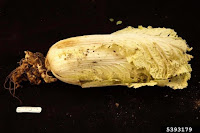 |
| Image 1: The magic ingredient is in the root not in the commonly eaten leaves of "bok choy". Chances that you will find a "whole" (including the root) chinese cabbage" (lat. brassica rapa) at your local supermarket, are yet very low... but wouldn't this be a good reason to start gardening really "whole" foods in your backyard? (img. Wikigardener) |
If you are a student of the SuppVersity, you are probably already annoyed by my favorite slogan "
Nature knows best!" Nevertheless, I will not tire to repeat that "
eating your way to a leaner and healthier you" is probably the only sustainable alternative on a side-effect ridden life on drugs such as Xenical.
As Trisha Gura points out in a
newsitem on sciencemag.com,
[t]he current trio of [weight loss] drugs on the market, endocrinologists say, is, at
best, weak and, at worst, plagued by side effects. Hoffmann-La
Roche's Xenical, for instance, blocks
fat-digesting enzymes called lipases. That prevents the gut from
digesting and absorbing
fat. But lipids aren't the only molecules
malabsorbed; Xenical also causes cramping and severe diarrhea in many
obese patients
because water molecules also fail to be taken up
by the gut.
Thus, the study results of Sojin An and his colleagues from five different research centers in the Republic of Korea, which although they have been published back in 2009, landed in my inbox only recently, come along quite handy. In a
8-week controlled trial the scientists found that the addition of
50mg/kg of an ethanolic extract from Brassica campestris spp. rapa roots (human equivalent: 4mg/kg) to the high fat diet (+25% more calories than standard chow) of ICR (imprinting control region) mice
did not only ameliorate the weight and fat gain, but even reduced both gains in body weight (-3%), as well as white adipose tissue weight (-8%) compared to the normal fed control group.
 |
| Figure
1: Weight gain, fat gain (white adipose tissues) and energy intake of mice on a hypercaloric high fat diet (HFD) supplemented
with either 50mg/kg chinese cabbage root extract or Orlistat (Xenical); values expressed relative to control group on normal chow (data calculated based on An. 2009) |
The cabbage root extract outperformed Xenical not only in terms of its effect on body weight and fat accumulation, other than the pharmacological fat-blocker, it also preserved the leptin sensitivity of the mice, which was profoundly compromised (as can be seen by the +25% increase in leptin) in the Orlistat group (cf. figure 2).
 |
| Figure 2: Relative changes in blood lipids and adipokines in mice on a hypercaloric high fat diet (HFD) supplemented
with either 50mg/kg chinese cabbage root extract or Orlistat (Xenical);
values expressed relative to control group on normal chow (data
calculated based on An. 2009) |
The underlying mechanism behind all that is probably related to the
2-fold increase in beta-3 adrenergic receptor and the 3-fold increase in hormone-sensitive lipase (HSL) gene expression the researchers measured in the white adipose tissue of the animals. Both of them are intricately involved in the breakdown and release of stored triglycerides and their expression in rodents is suppressed upon high fat feeding.
In case you are as annoyed as I would be by the
branding in the figures, I suggest you tell my friend "
The Press" over at
Anabolic Minds that
"copy + pasting" the work of others like
that, instead of citing only parts of the article and linking back to the source, is not what one would expect of an "anabolic mind". Thanks!
My repeated advice to "
eat whole foods", gets a whole new meaning, however, when you further consider that
- fatty acids from the pollen of brassica campestris have been shown to have a "strong inhibitory" effect on aromatase (Yang. 2009),
- the leaves protect "against in vivo genotoxicity and oxidative stress" (Tiku. 2008), and
- the chloroform extract from its pollen kills prostate cancer cells (Wu. 2007),
doesn't it? There is yet one obvious caveat to this advice. Without a green thumb, as Carl Lenore's significant other, Alisa Profumo, has one, it will be hard to get your hands on a
whole brassica campestris plant, i.e. its leaves, roots and the pollen-laden blooms... ah, and just in case you take this insight as an opportunity to start gardening, I suggest you go and check out episode #703 of Super Human Radio "
Urban Gardening: Like Your Life Depends On It" - who knows, one day your life could actually depend on it ;-)






